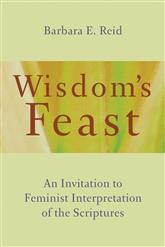Feminist biblical interpretation is not a brand new discipline or method, it has been around for several decades at least. But I am impressed with its growth in the last few years. In 2012 we saw the publication of the Handbook of Women Biblical Interpreters (Baker). Just the other day I received in my mailbox a book called Women in the Story of Jesus: The Gospels through the Eyes of Nineteenth-Century Female Biblical Interpreters (ed. M. Ann Taylor and H.E. Weird; Eerdmans, 2016).
 I would also like to point out a fantastic introduction to feminist interpretation by Barbara Reid called Wisdom’s Feast: An Invitation to Feminist Interpretation of the Scriptures (Eerdmans, 2016). I know that when I was in seminary, I simply assumed all feminist work on Scripture picked apart and deconstructed Scripture with a hermeneutic of rejection. I now know that I was misguided – mostly out of ignorance. Reid’s work is a rich introduction that I wish I had in seminary. One of the most insightful ways that I have been told to think about feminist interpretation is this: seeing women where they are demeaned, suppressed, or left out and seeking to show them equal dignity and respect. This has been very transformative for my work in Scripture and apparently I too am a feminist! I am going to find a way to require my students to read Wisdom’s Feast.
I would also like to point out a fantastic introduction to feminist interpretation by Barbara Reid called Wisdom’s Feast: An Invitation to Feminist Interpretation of the Scriptures (Eerdmans, 2016). I know that when I was in seminary, I simply assumed all feminist work on Scripture picked apart and deconstructed Scripture with a hermeneutic of rejection. I now know that I was misguided – mostly out of ignorance. Reid’s work is a rich introduction that I wish I had in seminary. One of the most insightful ways that I have been told to think about feminist interpretation is this: seeing women where they are demeaned, suppressed, or left out and seeking to show them equal dignity and respect. This has been very transformative for my work in Scripture and apparently I too am a feminist! I am going to find a way to require my students to read Wisdom’s Feast.
That brings me to another important new book/series. Liturgical Press (/Glazier Press)  has launched a great new series called the “Wisdom Commentary” which studies various biblical texts from a feministic perspective. I enjoyed the editorial preface; here is one excerpt
has launched a great new series called the “Wisdom Commentary” which studies various biblical texts from a feministic perspective. I enjoyed the editorial preface; here is one excerpt
…the aim of this series is not to lead readers to reject the authority of the biblical text. Rather, the aim is to promote better understanding of the contexts from which the text arose and of the rhetorical effects it has on women and men in contemporary contexts. Such understanding can lead to a deepening of faith, with the Bible serving as an aid to bring flourishing of life. (xxx)
I ordered the 1-2 Thess volume because that is where my research is focused nowadays, this volume written by Florence Gillman, Mary Ann Beavis, and HyeRan Kim-Cragg. Here is what they wrote about their approach to these letters:
My approach to feminist analysis…is interested in the world of people behind the text of 1 Thess, that is, the subject location underlying the biblical document. This includes learning primarily about women, their experiences, and their concerns that have usually been overlooked, submerged, ignored, and even disvalued not only in ancient male writer’s andocentric worldviews but also in later interpreters’ explications of the text. (9)
It has been suggested that the church in Thessalonica in the first century was male-only. Gillman (et al) obviously takes interest in this theory and (in my humble opinion) raises important questions about its basis of evidence, and also considers evidence to the contrary (see 31-33).
I am delighted to see feminist biblical interpretation thrive, and I am hopeful that this Wisdom series will be recognized for its contribution to biblical scholarship overall.











